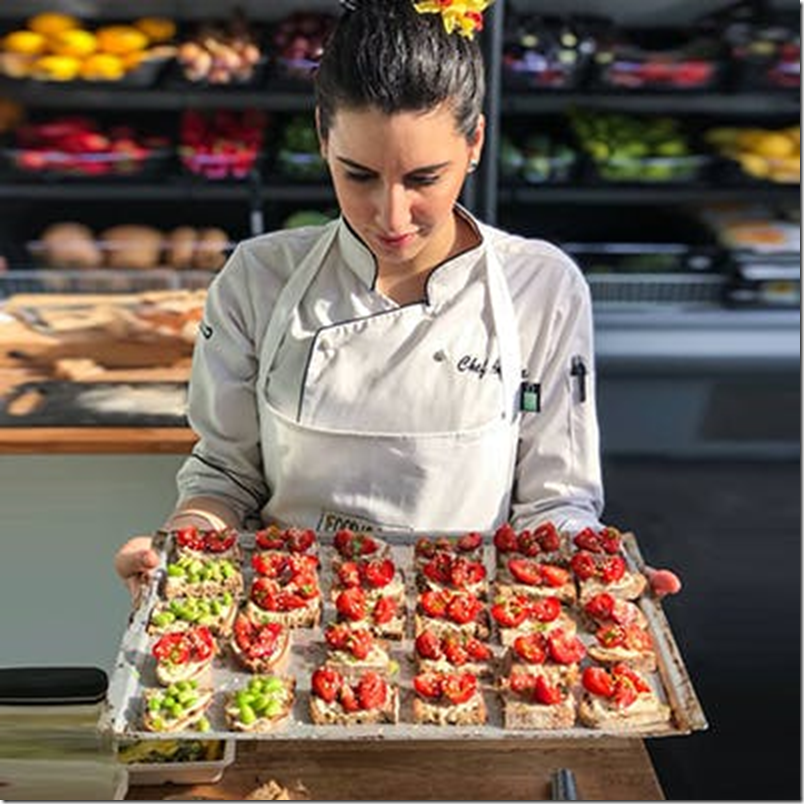Anahita Dhondy doesn’t like being called ‘female’ or ‘celebrity’ chef, though she fits both definitions. Over a couple of rushed phone calls and food orders, we talk to this 28-year-old on why there aren’t enough women chefs in India.
By Devika Chitnis, yourstory.com
The chef’s coat, hair tied back, shuffling pots and pans in a high-pressure kitchen and delegating tasks while making Mutton Dhansak at SodaBottleOpenerWala in Gurgaon, Anahita Dhondy is as close to the perfect definition of a chef as can get.
Anahita used some yogurt, overripe strawberries, and some stale bread to make her recipes. She believes in local and sustainable ways of cooking food. Photo: @dennistheprescott, from Anahita’s Instagram
At 22, she was the chef-manager at the popular Parsi restaurant, and now, at 28, she is a chef-partner. Anahita
When she interned in a kitchen, she realised she wasn’t going to get any work experience if the chef didn’t trust her. She says she started small, and worked her way around the kitchen to higher tasks.
“I see a lot of girls in the kitchen saying, ‘I won’t do this, I won’t lift that’. Those are opportunities – take them up. Do some heavy-lifting, work it out,” she says. “In the kitchen, we are all equals.”
It took a bit of rescheduling to get her to talk to HerStory. She was either travelling to Bhubaneshwar or some other Tier-II city collecting recipes (we know this from her appetising Instagram feed), or was in and out of meetings with her peers discussing menus. We don’t want to complain, but merely illustrate a chef’s job is more than just plating a dish.
Chef Anahita Dhondy with Chef Gary Mehigan from MasterChef, Australia in Bengaluru. They were at World On A Plate, a gourmet festival in India. Photo: Instagram @anahitadhondy
“The principal of my culinary school told me that you will miss a large part of your family functions and holidays in a year,” says Anahita. “He added – you will work long, exhausting hours in hot kitchens.” With this picture, Anahita studied at the Institute of Hotel Management, Aurangabad, and then, Le Cordon Bleu in London.
When taking over her kitchen as a chef-manager, delegating at first was seen as barking orders, and her team wouldn’t take her instructions seriously. She tried a new approach – she worked with them, instead of making them work for her. “I could see the difference. They started respecting me for my work and my inputs. Plus, I learnt a thing or two from them.”
“The people I work with, in the kitchen haven’t seen too many women chefs, and aren’t used to taking orders from them,” says Anahita. “When I started doing the work – peeling onions and boiling eggs with them, they understood that I know my skill and mean business. They were surprised I cooked all the dishes myself and, then, started opening up.”
“The bigger the dream, the more important the team” Anahita quotes Robin Sharma on her Instagram photo while she talks about her team at SodaBottleOpenerWala. Photo: @sbowindia
Anahita also sees a palpable change in their attitude towards women. “Now that they have worked with a woman chef, my teammates have a certain sense of pride when it comes to their girls. You can see if when someone in the team has a baby girl – the conversation has changed. They seem excited, hopeful. I can see the difference in their thinking,” she adds.
On what India needs to do to get more women as chefs in the industry, Anahita feels girls need to be ready for difficult and exhaustive routines. “You can’t say that you want to work in AC kitchens. You have to be dedicated, you have to have grit and the willpower, and educate yourself. Experiment with recipes from different states and cuisines in India. Go back to grandma’s recipes. Learn from the different people and be passionate. Then, the industry will see a drastic shift in the demographic,” she says.


